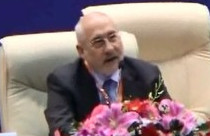Scholars propose ways to protect multi-ethnic language resources
Author : LI MENG, WANG FENG and LONG CONGJUN Source : Chinese Social Sciences Today 2020-02-10
Recently, the Second Seminar of the Ethnic Language Use Committee of the Chinese Ethnic Languages Society and the First Forum on Chinese Ethnic Language Use were held in Beijing. Scholars at the conference conducted in-depth exchange centering on the use of ethnic languages from a macroscopic perspective; the promotion of normalization, standardization and informatization in this field; the status quo and measures to address it; the construction of these ethnic language disciplines; and the protection of language resources.
Ding Shiqing, a professor from the School of Chinese Ethnic Minority Languages and Literatures at Minzu University of China, said that China has rich language resources, with more than 130 languages, over 30 of which have their own writing forms. Ethnic groups with relatively small populations have accumulated rich language resources, including ancient books, ancient characters, newly-created characters, oral materials, as well as the language resources contained in literature, religion, and intangible cultural heritage.
Xu Shixuan, a research fellow from the Institute of Ethnology and Anthropology (IEA) at the Chinese Academy of Social Sciences (CASS), introduced the concepts, methods and technologies of international academic circles for language revitalization and put forward the following approaches to address the challenges facing language revitalization: the internal efforts of ethnic groups, external support, strengthened ethnic identity and motivation to learn the ethnic languages, improved ethnic language instruction, and the establishment of language databases.
Wen Qiufang, a professor from the National Research Center for Foreign Language Education at Beijing Foreign Studies University, said that national language capacity is different from individual language competence. Having national language capacity means being able to serve national development in future. The national language capacity is composed of three components: governing competency, key competency and strategic competency. The national governing competency of language involves the construction of a national language governance system, the formulation and implementation of a national language plan, and research and exchange on the national language situation.
Hu He, a research fellow from the IEA, said that the Unified Platform for Speech Acoustics Parameters of Chinese Ethnic Minority Languages uses internationally used speech acoustic analysis software to extract various acoustic parameters that effectively characterize the speech segments and supra-segments of a language. This allows the integration of these parameters into a complete database of speech acoustic parameters and processing with database management software.
Long Congjun, an associate research fellow from the IEA, said that many linguistic features of the dialects and languages surrounding the Himalayas are fading away. It is of high necessity to collect relevant resources to build a phonetic database of dialects and languages around the Himalayas, a task based on data-driven natural language processing.
Li Daqin, a professor from the School of Literature at the Communication University of China, said that the eastern Himalayas is an important region in the construction of the Belt and Road (B&R) initiative. There are more than a dozen cross-border languages sharing common cultural genes in this region. Conducting field investigations on some of these languages to study their commonalities, phylogenetic relationships and current interactive situations can provide beneficial academic support for interconnection among B&R countries in this region and for the development of their cultural industries.
Dai Qingxia, vice president of the Chinese Linguistic Society and an honorary senior professor of the Minzu University of China, said that phonetic records must meet relevant linguistic standards, use the international phonetic system to mark phonemes, and summarize a normative phonetic system or a phonemic system. For Sino-Tibetan languages, the construction of phonetic records is even more important. Accurate phonetic records are usually the first step when doing research on a new language or a new dialect. In this new era, academic circles should improve the ability of phonetic records to meet the new needs of the development of the different ethnic languages of China.
Huang Chenglong, a research fellow from the IEA, said that documentary linguistics can make full use of people’s preference for their native languages and cultures to record more language resources and encourage them to narrate in their own mother tongues. Documentary linguistics takes advantage of different forms of multimedia to show the full view of rich ethnic culture, provides highfidelity and reliable data for linguistics and other related disciplines, and thus preserves the languages and cultures in their active states.
Interview with Wang Gungwu on significance of studying overseas Chinese
Wang Gungwu is a distinguished Australian historian who studies overseas Chinese. He currently works at the Faculty o...
-
On the rat/mouse of the zodiac
2020-02-20
-
Regional development calls for Huaihe culture’s soft power
2020-01-10
-
Archaeological discoveries unveil Maritime Silk Road
2020-01-06
-
China’s industrial art printing
2019-12-10
-
Yue-Gan Ancient Road: A journey into Hakka history
2019-05-13
-
The Lantern Festival in Dream of the Red Chamber
2019-02-18














 2011-2013 by www.cssn.cn. All Rights Reserved
2011-2013 by www.cssn.cn. All Rights Reserved